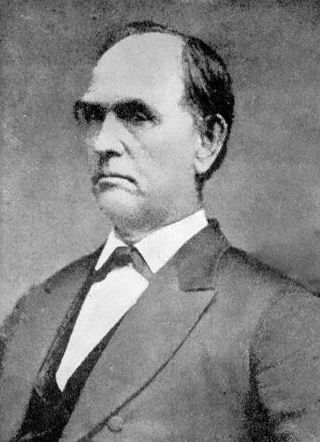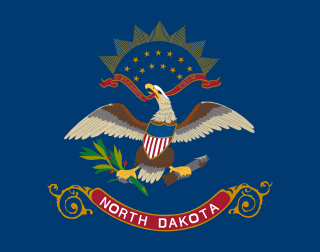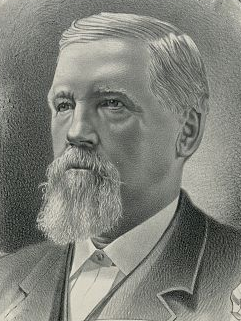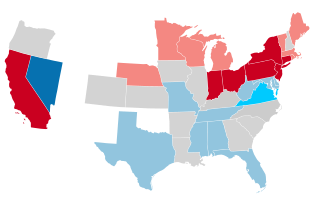
Augustus Caesar Dodge was a Democratic delegate to the U.S. House of Representatives from Iowa Territory, a U.S. minister to Spain, and one of the first set of United States senators to represent Iowa after it was admitted to the Union as a state. His father, Henry Dodge, served as a U.S. senator from Wisconsin; the two were the first and so far the only father-son pair to serve concurrently in the Senate, which they did from 1848 to 1855.

The Illinois General Assembly is the legislature of the U.S. state of Illinois. It has two chambers, the Illinois House of Representatives and the Illinois Senate. The General Assembly was created by the first state constitution adopted in 1818. As of 2023, the current General Assembly is the 103rd; the term of an assembly lasts two years.

James Bennett McCreary was an American lawyer and politician from Kentucky. He represented the state in both houses of the U.S. Congress and served as its 27th and 37th governor. Shortly after graduating from law school, he was commissioned as the only major in the 11th Kentucky Cavalry, serving under Confederate Brigadier General John Hunt Morgan during the American Civil War. He returned to his legal practice after the war. In 1869, he was elected to the Kentucky House of Representatives where he served until 1875; he was twice chosen Speaker of the House. At their 1875 nominating convention, state Democrats chose McCreary as their nominee for governor, and he won an easy victory over Republican John Marshall Harlan. With the state still feeling the effects of the Panic of 1873, most of McCreary's actions as governor were aimed at easing the plight of the state's poor farmers.

The 1912–13 United States Senate elections were held on various dates in various states. They were the last U.S. Senate elections before the ratification of the Seventeenth Amendment in 1913, establishing direct elections for all Senate seats. Senators had been primarily chosen by state legislatures. Senators were elected over a wide range of time throughout 1912 and 1913, and a seat may have been filled months late or remained vacant due to legislative deadlock. Some states elected their senators directly even before passage of Seventeenth Amendment. Oregon pioneered direct election and experimented with different measures over several years until it succeeded in 1907. Soon after, Nebraska followed suit and laid the foundation for other states to adopt measures reflecting the people's will. By 1912, as many as 29 states elected senators either as nominees of their party's primary or in conjunction with a general election.

George Edward Sangmeister was an American politician and United States Representative from Illinois. He originally represented Illinois' 4th congressional district, before it was renumbered as the 11th district.

The politics of North Dakota were shaped historically by early settlement by people from the Northern Tier, who carried their politics west ultimately from New England, upstate New York, and the Upper Midwest. The area and state also received numerous European immigrants and migrants, particularly during the era of opening up of former Native American lands for sale and settlement.

George Hoadley was a long serving popular provincial politician and rancher from Alberta, Canada. Hoadley served a legendary career in the Alberta legislature during the early years when he led the Alberta Conservative Party in opposition and his effect in shaping policy in the province is widely remembered to this day as he served a broad range of portfolios during his years in the United Farmers government.

Alson Jenness Streeter was an American farmer, miner and politician who was the Union Labor Party nominee in the United States presidential election of 1888. He was also an early member of the National Grange of the Order of Patrons of Husbandry following its foundation in the 1860s and supported Granger Laws while in office.

The 1880–81 United States Senate elections were held on various dates in various states, coinciding with the presidential election of 1880. As these U.S. Senate elections were prior to the ratification of the Seventeenth Amendment in 1913, senators were chosen by state legislatures. Senators were elected over a wide range of time throughout 1880 and 1881, and a seat may have been filled months late or remained vacant due to legislative deadlock. In these elections, terms were up for the senators in Class 1.

The 1890–91 United States Senate elections were held on various dates in various states. As these U.S. Senate elections were prior to the ratification of the Seventeenth Amendment in 1913, senators were chosen by state legislatures. Senators were elected over a wide range of time throughout 1890 and 1891, and a seat may have been filled months late or remained vacant due to legislative deadlock. In these elections, terms were up for the senators in Class 3.

William Rudolph Smith was an American lawyer, politician, pioneer, and historian from Pennsylvania who served as the 5th Attorney General of Wisconsin, the first President of the Wisconsin Historical Society, and the first Adjutant General of Wisconsin.
Norman Leslie James was an American farmer, merchant, and Republican politician. He was a member of the Wisconsin State Senate and State Assembly, representing Richland County. His brother David G. James also served in the Wisconsin Senate, representing the same district.

Two United States Senate elections were held in Illinois on March 26, 1913. The two elections were interconnected through a compromise made to elect a Democrat in the regular election and a Republican in the special election.

The 1930 United States Senate election in Illinois took place on November 4, 1930.

The 1890 Minnesota Senate election was held in the U.S. state of Minnesota on November 4, 1890, to elect members to the Senate of the 27th and 28th Minnesota Legislatures.

Herman Emil Taubeneck was an American politician who served as a member of the Illinois House of Representatives and as National Chairman of the People's Party.

Hosea Hartwell Moore was an American medical doctor, farmer, and politician who served as a member of the Illinois House of Representatives from 1891 to 1893.

Cicero Jefferson Lindly (1857–1926) was an American politician and judge who served as a Republican member of the Illinois House of Representatives.
The 1891 United States Senate election in Illinois was held from January 13 to March 11, 1891. The contentious election was determined by a joint session of the Illinois General Assembly. The election went on for 154 ballots and cost the State of Illinois approximately $150,000.
















